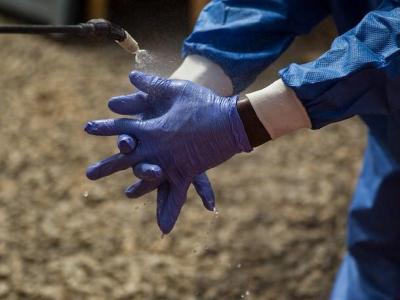Jan 18, 2013
Researchers test-drive dengue vaccine combos
A phase 1 trial of four different live-attenuated tetravalent (LATV) dengue vaccines found that all achieved a preset immunity response target and were well-tolerated, except for a minor rash. The study, led by Johns Hopkins researchers, appeared yesterday in the Journal of Infectious Diseases. Developing a vaccine against dengue has been especially challenging, because it needs to target four serotypes that interact at the immunologic level. Researchers evaluated a single dose of four formulations that contained different combinations of six different previously developed monovalent vaccines. The randomized placebo-controlled study included 113 flavivirus-naive adults. Investigators measures serum neutralizing antibodies against all four dengue viruses on days 0, 28, 42, and 180. They also monitored adverse events. Each formulation induced a trivalent or better antibody response in 75% to 90% of the subjects, but one of the
combinations showed the response in 90% of the vaccines and stood out as a promising vaccine candidate, according to the authors. Better response seemed to correlate with rash and among subjects who weren't black, but black race was associated with reduced viremia.
Jan 17 J Infect Dis abstract
Cholera deaths in Haiti approach 8,000
Haiti has now recorded 638,511 cases of cholera since the outbreak began in October 2010, with 352,532 patients (55%) hospitalized and 7,943 dead, the Pan American Health Organization (PAHO) said in an update this week. Case-fatality rates have varied from 0.7% in Port-au-Prince to 4.0% in Grand Anse. Cases in the neighboring Dominican Republic, where the outbreak began in November 2010, have reached 29,490, of which 426 have been fatal. The report also confirms that Cuba has had 51 cholera cases this year through Jan 14, a total that was reported earlier this week by the media.
Jan 15 PAHO report
Jan 15 CIDRAP News scan on cholera in Cuba
Vaccination gaps stall measles elimination progress in some regions
Though the overall number of measles illnesses and deaths have dropped over the past decade or so, large outbreaks in some countries are jeopardizing progress toward elimination goals in some regions of the globe, experts from the World Health Organization (WHO) and US Centers for Disease Control and Prevention (CDC) reported today in their respective weekly publications. Their group analyzed countries' measles surveillance and vaccination data from 2000 to 2011. Measles deaths dropped 71% during that period, and the number of new cases decreased by 58%. The percentage of children who received the first of two recommended measles vaccine doses rose from 72% to 84% during those years, while the number of countries that routinely provide the second dose increased from 97 to 141, the group reported. However, gaps leave about 20 million kids unprotected from measles and threaten disease elimination goals in the WHO's
African, Southeast Asian, European, and Eastern Mediterranean regions. More than half of the unprotected kids live in five countries: the Democratic Republic of Congo, Ethiopia, India, Nigeria, and Pakistan. The authors reported that those five countries all had large outbreaks in 2011. They noted, however, that new resources from global health partners and commitments by countries to implement control measures could help more regions meet their measles targets.
Jan 18 MMWR report
Jan 18 Wkly Epidemiol Rec report
Jan 17 WHO press release
US, Canada team up on foreign animal disease zoning measures
The United States and Canada have signed an agreement to recognize one another's zoning measures in the event of a foreign animal disease outbreak such as foot and mouth disease, according to a Jan 16 statement from the Canadian government. The agreement is designed to minimize trade disruptions while preventing the spread of disease. The move is part of a December 2011 commitment between the two countries to better align US and Canadian regulations. Officials are still working on a guidance framework for the plan, but under the arrangement both countries will accept each other's decisions to establish, maintain, and release disease control and eradication zones if authorities detect a foreign animal disease outbreak. For example, if Canadian officials designate a disease control or eradiation zone on their soil, the US Department of Agriculture would allow trade to continue from disease-free parts of Canada, with the same
arrangement if US officials establish a foreign animal disease control zone, according to the statement.
Jan 16 Canadian government statement



















